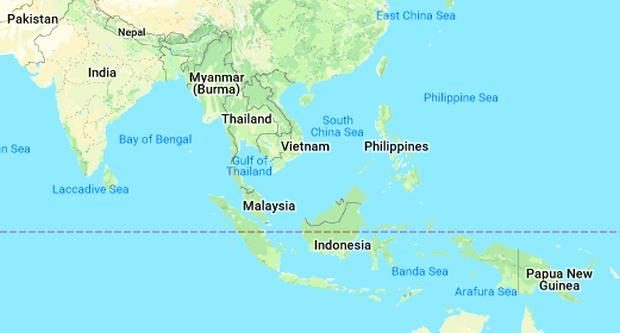
Parts of the 10-country region have long struggled with Islamic militancy and the emergence of IS has served as a new rallying point for radicals and re-energized extremist groups. (Image from Google Maps)
SINGAPORE — Southeast Asia faces “very real” threats from the Islamic State (IS) group despite their defeat in the Middle East, as well as cyberattacks, Singapore’s prime minister warned Saturday at a regional summit.
Parts of the 10-country region have long struggled with Islamic militancy and the emergence of IS has served as a new rallying point for radicals and re-energized extremist groups.
A deadly gun and suicide-bombing attack in the Indonesian capital Jakarta in 2016 was the first IS-claimed assault in the region, while the Philippine city of Marawi was overrun last year by fighters loyal to the jihadists, triggering a months-long battle that killed hundreds.
Fears are also growing that Southeast Asia, which is home to booming economies where a growing number of people are adopting digital technology in their everyday lives, could be increasingly targeted by cyberattackers.
Opening the summit of the Association of Southeast Asian Nations (Asean) in Singapore, Prime Minister Lee Hsien Loong warned that IS continues to threaten the region, home to about 650 million people, despite their military defeat in Iraq and Syria.
He also warned the move towards digitalisation has made countries more vulnerable to cyberattacks.
“Southeast Asia is at peace, but these threats are very real,” he said.
“We need to be resilient to both conventional threats, and also non-conventional threats such as terrorism and cyberattacks.”
The leaders at a working dinner Friday ahead of their formal summit agreed to increase coordination to shield countries from cyberattacks.
Trade war fears
In a bid to give teeth to the fight against terrorism and other transnational crimes, the leaders agreed for their officials to start talks on an Asean-wide extradition treaty.
Officials have already completed a model of a treaty on which a regional agreement could be based.
“We now need just to formalise that (the model treaty) and to start negotiating an actual ASEAN extradition treaty,” Lee said at a post-summit news conference.
“It should not take very long because the model is already there, it’s just a matter of tweaking and making sure it’s in a complete document.”
In an final statement, the leaders vowed to fight a “rising tide of protectionism” and intensify efforts to conclude talks for a massive 16-nation free trade zone that would include China and India, called the Regional Comprehensive Economic Partnership.
Lee warned that the open global trading system, which has allowed many of the region’s export-driven economies to flourish, has come under increasing threat due to protectionist policies in major economies.
“The political mood in many countries has shifted against free trade,” he said. “In particular, the trade tensions between the US and China are worrying concerns.”
Washington and Beijing have imposed tit-for-tat tariffs on billions of dollars worth of goods which analysts said could escalate into a global trade war and scupper global growth.
Asean groups together Brunei, Cambodia, Indonesia, Laos, Malaysia, Myanmar, the Philippines, Singapore, Thailand and Vietnam.